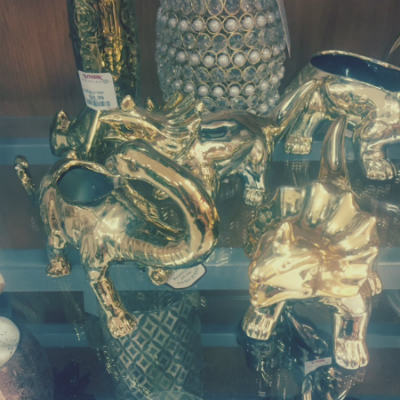Posted on March 14, 2018
Brassless Balls

Several years ago I went through a phase of collecting brass (and sometimes bronze) statues from antique and thrift stores. Through working for a company that distributed electronic components, I learned that the price of copper had gone up quite a bit (brass contains both copper and zinc.) This was often a factor in the price increases of certain products. “Tell him we can’t honor that price anymore. The price of copper has gone up,” would be a typical explanation you’d have to give to a customer.
Anyways, occasionally I would have the inclination to go to contemporary outlet and department stores hoping to find similar statues and artifacts, with the hope that I could score something neat that might increase in value in the future. Well, I was sorely disappointed to discover that nearly everything was absolute junk. Worse than that though, was that these companies would try to pass off something that was meant to look like one of those nice brass statues or bookends, yet it would be merely come cheap metal or ceramic that was slathered with gold paint. To add insult to injury, they would sell it for the same price (even adjusted for inflation) as what one could get a quality brass knick knack back when you could still get them 20 years ago. The savings in manufacturing a cheaper, lower quality product is barely even passed on to the consumer. My guess is that if there are people still making legit brass and bronze statues, they are being sold as luxury items at exponentially higher prices. This might all seem trivial, but it’s a microcosm for what corporations do:
1. Manufacture something as cheaply as they can and provide the lowest quality product that people will accept.
2. Claim to be offering the product at a better price, even though they’re pocketing the bulk of the money they’re by saving using cheaper materials and labor, and the consumer is still paying almost the same as before.
3. Offer something as a luxury item that used to be a standard, inexpensive item or add-on. A good example of this is when hotels started tacking on “resort fees” for things that used to be free like using the pool or making a local phone call from your room.
4. Copy each other, so that all companies basically have the same policies, processes and products, leaving you with no choice (you decide to take your business to another department store and then another, only to find that none of them carry genuine brass statues, and the gold painted ceramic triceratops is your only option.)
Libertarians or republicans might read this and say, “Well that’s just the free market, bro.” Perhaps, but let’s not pretend that the free market innovation inherently results in better quality products being made. They are only “better” in the sense of being able to make a more efficient profit for someone, somewhere. Just as beautiful and intelligent creatures don’t always survive the evolution and natural selection process without a little help from their friends, often times, the unchecked free market often leads to one being surrounded by cheap junk.

Brandon Adamson is the author of Skytrain to Nowhere
